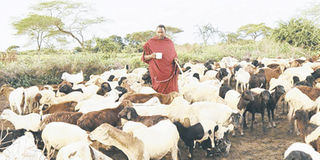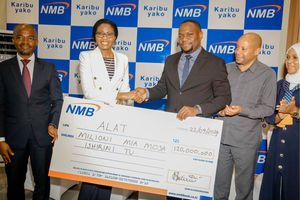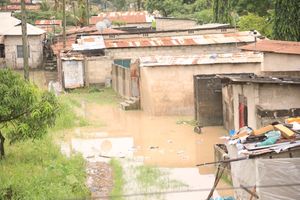Why politics not sole solution for woes in society

Mr Edward Loure attends to his livestock. The man pioneered a new model for conservation and development that gives land titles to indigenous communities rather than individuals. PHOTO | COURTESY OF GOLDMAN ENVIRONMENTAL PRIZE
What you need to know:
The Africa’s 2016 environmental hero says, in addition to politics, there are several alternative ways of quenching one’s quest for helping the society if he is really determined.
Arusha. Many believe that the surest way to assist marginalised communities is to resort to politics, but Edward Loure, a member of the Maasai pastoralist community from Simanjiro in Manyara Region proves them wrong.
The Africa’s 2016 environmental hero says, in addition to politics, there are several alternative ways of quenching one’s quest for helping the society if he is really determined.
Among them is the approach he himself took about two decades ago when he first embarked silently on a struggle for indigenous communities to own their ancestral lands.
“Land is life for pastoralists and hunter-gatherers, we must ensure they own, manage, and benefit from it,” says Loure, explaining: “When people are better off, so are the places and the wildlife they live with.”
It all started with an idea he conceived of establishing a non-governmental organisation (NGO) to fight for land rights of the marginalised indigenous communities.
Last month, Loure was the first Tanzanian to be awarded the 2016 Goldman Environmental Prize for Africa, a prestigious honour to grassroots environmental activists dating back to 26 years ago.
The low-profile activist was particularly feted for his style of working in partnership with governments, development partners and communities to secure indigenous lands without colliding with authorities as is the case with politics.
The late San Francisco, civic leaders and philanthropists Richard and Rhoda Goldman established the Goldman Environmental Prize in 1989.
An international jury select winners of the prize from confidential nominations a worldwide network of environmental organisations and individuals submit to it.
Through an NGO he works with, namely Ujamaa Community Resource Team (UCRT), Loure boasts assisting marginalised indigenous groups across northern Tanzania to secure a Certificate of Customary Right of Occupancy (CCRO) each.
With the CCROs in place, the marginalised indigenous communities have not secured land for themselves only, but also for their livestock and the surrounding wildlife animals which form a basis for their livelihood.
They are generating millions of shillings and foreign currencies for themselves and central and local government in revenue as well as for businesses in the northern tourism circuit.
The Hadzabe, one of the few surviving relics of the hunter-gatherers remaining on earth, whose population does not exceed 1,500, is among the marginalised communities granted the CCROs few years ago. As we speak, the hunter-gatherers community has earned $100,000 since through a carbon offset project to fight climate change alone.
“We are very grateful to our son Loure, he navigated through all traditional odds to enable us women in the Maasai community to own land. …God bless him so that he continues with the struggle,” Magreth Moisari from Sukru Village in Simanjiro District says.
Margreth is but only one of the members of the marginalised indigenous communities which have so far benefited from half a million hectares of communal land they secured through the CCROs.
Several other beneficiaries of the gifted mind and hands of Loure admit the young man is talented in bringing together communities, authorities and development partners for a common goal.
“Our plan is to double the amount of the land indigenous communities own in Tanzania come 2020,” says the soft spoken Loure, vowing that he will not rest until the entire communal lands are, in a long term, secured.
Securing the lands will not only protect indigenous communities and their livelihood, but will also foster sustainable development and combat climate change, he says at Kilimanjaro International Airport upon his arrival from San Francisco, California, in the US at the weekend.
Loure deserves the honour for his inclusive way of doing things in his struggle for securing indigenous lands, says former Singida regional commissioner Parseko Kone.
“I’m so happy that you’ve become a hero for doing such a noble work, for land is the most precious and limited resource for the poor,” Dr Kone adds.
He challenges the award winner and his workmates to consider intensifying the struggle for indigenous lands belonging to ethnic groups such as Hadzabe and Ndorobos’ to be secured and preventing the endangered groups from being wiped out of the earth’s surface.
Edward Porokwa, the civil society organisations’ representative, says Loure has raised the profile of Tanzania’s indigenous communities to the global chart.
UCRT executive director Makko Sindandei concurs with him, saying: “This award helps to bring attention to the rights of the marginalised communities of pastoralists and hunters who are at risk of losing their communal land to outside interests.”
He adds: “We’re excited and proud of our teammate Loure and the UCRT, as an organisation, to receive such a prestigious recognition.”
The UCRT along with national and international partners are in the next couple of years looking to replicate the CCRO model throughout Tanzania by identifying communal grazing lands.
The UCRT’s overarching goal is to scale up efforts for designation of community-based lands to become a key component of land use planning and management in a bid to strike a balance between needs of Tanzanians and environmental and economic concerns.




